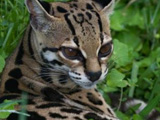|
|
TODAY.AZ / Weird / Interesting
Documented for the 1st time: Wild cat found mimicking monkey calls
10 July 2010 [12:25] - TODAY.AZ
 In a fascinating example of vocal mimicry, researchers from the Wildlife Conservation Society (WCS) and UFAM (Federal University of Amazonas) have documented a wild cat species imitating the call of its intended victim: a small, squirrel-sized monkey known as a pied tamarin. This is the first recorded instance of a wild cat species in the Americas mimicking the calls of its prey.
In a fascinating example of vocal mimicry, researchers from the Wildlife Conservation Society (WCS) and UFAM (Federal University of Amazonas) have documented a wild cat species imitating the call of its intended victim: a small, squirrel-sized monkey known as a pied tamarin. This is the first recorded instance of a wild cat species in the Americas mimicking the calls of its prey.The extraordinary behavior was recorded by researchers from the Wildlife Conservation Society and UFAM in the Amazonian forests of the Reserva Florestal Adolpho Ducke in Brazil. The observations confirmed what until now had been only anecdotal reports from Amazonian inhabitants of wild cat species -- including jaguars and pumas -- actually mimicking primates, agoutis, and other species in order to draw them within striking range.
The observations appear in the June issue of Neotropical Primates. The authors of the paper include: Fabiano de Oliveira Calleia of Projeto Sauim-de-Coleira/UFAM; Fabio Rohe of the Wildlife Conservation Society; and Marcelo Gordo of Projeto Sauim-de-Coleira/UFAM.
"Cats are known for their physical agility, but this vocal manipulation of prey species indicates a psychological cunning which merits further study," said WCS researcher Fabio Rohe.
Researchers first recorded the incident in 2005 when a group of eight pied tamarins were feeding in a ficus tree. They then observed a margay emitting calls similar to those made by tamarin babies. This attracted the attention of a tamarin "sentinel," which climbed down from the tree to investigate the sounds coming from a tangle of vines called lianas. While the sentinel monkey started vocalizing to warn the rest of the group of the strange calls, the monkeys were clearly confounded by these familiar vocalizations, choosing to investigate rather than flee. Four other tamarins climbed down to assess the nature of the calls. At that moment, a margay emerged from the foliage walking down the trunk of a tree in a squirrel-like fashion, jumping down and then moving towards the monkeys. Realizing the ruse, the sentinel screamed an alarm and sent the other tamarins fleeing.
While this specific instance of mimicry was unsuccessful, researchers were amazed at the ingenuity of the hunting strategy.
"This observation further proves the reliability of information obtained from Amazonian inhabitants," said Dr. Avecita Chicchón, director of the Wildlife Conservation Society's Latin America Program. "This means that accounts of jaguars and pumas using the same vocal mimicry to attract prey--but not yet recorded by scientists--also deserve investigation."
WCS is currently monitoring populations of the pied tamarin -- listed as "Endangered" on the IUCN's Red List -- and is seeking financial support to continue the study, which aims to protect this and other species from extinction. Next to Madagascar, the Amazon has the highest diversity of primates on Earth.
These behavioral insights also are indications of intact Amazon rainforest habitat. WCS works throughout the Amazon to evaluate the conservation importance of these rainforests, which have become increasingly threatened by development.
/Science Daily/
URL: http://www.today.az/news/interesting/70774.html
 Print version
Print version
Views: 2547
Connect with us. Get latest news and updates.
See Also
- 19 February 2025 [22:20]
Visa and Mastercard can return to Russia, but with restrictions - 05 February 2025 [19:41]
Japan plans to negotiate with Trump to increase LNG imports from United States - 23 January 2025 [23:20]
Dubai once again named cleanest city in the world - 06 December 2024 [22:20]
Are scented candles harmful to health? - 23 November 2024 [14:11]
Magnitude 4.5 earthquake hits Azerbaijan's Lachin - 20 November 2024 [23:30]
Launch vehicle with prototype of Starship made its sixth test flight - 27 October 2024 [09:00]
Fuel prices expected to rise in Sweden - 24 October 2024 [19:14]
Turkiye strikes terror targets in Iraq and Syria - 23 October 2024 [23:46]
Kazakhstan supplied almost entire volume of oil planned for 2024 to Germany in 9 months - 23 October 2024 [22:17]
Taiwan reported passage of Chinese Navy aircraft carrier near island
Most Popular
 Algeria expels 12 French diplomats amid rising diplomatic tensions
Algeria expels 12 French diplomats amid rising diplomatic tensions
 Azerbaijan discusses co-op & regional stability with Syrian Transitional Government
Azerbaijan discusses co-op & regional stability with Syrian Transitional Government
 Macron's Monday: scandal again, sent again
Macron's Monday: scandal again, sent again
 Azerbaijan, Qatar explore prospects for expanded healthcare cooperation
Azerbaijan, Qatar explore prospects for expanded healthcare cooperation
 Robert Kocharyan's promotion of ethnic hatred against Azerbaijanis exposed
Robert Kocharyan's promotion of ethnic hatred against Azerbaijanis exposed
 President approves partnership agreement on digital economy within OTS members
President approves partnership agreement on digital economy within OTS members
 Accused French spy Martin Ryan claims his ties were ‘personal’
Accused French spy Martin Ryan claims his ties were ‘personal’
